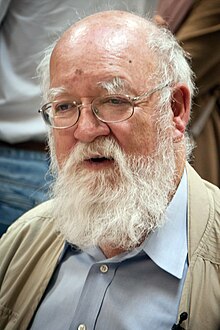 Here is Dennett, introducing his idea of an age of post-intelligent design:
Here is Dennett, introducing his idea of an age of post-intelligent design:
The age of intelligent design is only a few thousand years old ... We're now entering the age of post-intelligent design. Because what we've learned as intelligent designers is that evolution is cleverer than we are at some things.We're now turning to making technologies that are fundamentally Darwinian, or they're versions of natural selection. This is things like deep learning, the program that beat the world's Go champion, Alpha Go, these are technologies which do their work the way natural selection does. Mindlessly, without consciousness, without forethought, they grind out better and better and better designs.
And now, we have in effect black boxes that scientists can use, where they put in the data, they push the button, out comes an answer. They know it's a good answer. They have no idea how it got there. This is black box science. This is returning to our Darwinian roots and giving up on the idea of comprehension.
The problem with the idea of an era of post-intelligent design, is that it's likely nonsense. Evolution is characterised by increasing intelligence (give or take the occasional meteorite strike). The only way that there will be an age of post-intelligent design is if there's a massive disaster that wipes out all the intelligent agents. Machine intelligence isn't a regression to an earlier era of Darwinian design as Dennett claims. If scientists use a black box which they don't understand that doesn't mean there's no comprehension in the whole system - the machine could understand what is going on. Machine intelligence is an example of more and better intelligence. The proposed age of post-intelligent design doesn't make any sense. It is just wrong.






It won't be conscious design though. We'll understand the processes necessary to create the processes that solve the problem, but we won't understand the final processes ourselves. In addition, those processes won't in all likelihood be capable of self reflection so that they can understand themselves. Try "Blindsight" and "Echopraxia" by Peter Watts for some insight.
ReplyDeleteThere might possibly be an age of post-conscious design. That's different from what Dennett is claiming. I expect reflection will be useful to machines, though. It is not as though machines won't have a social life or won't be interested in modelling other, similar agents. Our relationships with machines will suck more if we think they are zombies. We will treat them more like trash then. The machine manufacturers might not like that. As a result, the machines might well start saying: "hey, don't hit me, that hurts!" I'm sure that philosophers will continue to debate whether the resulting machines are really conscious.
ReplyDelete